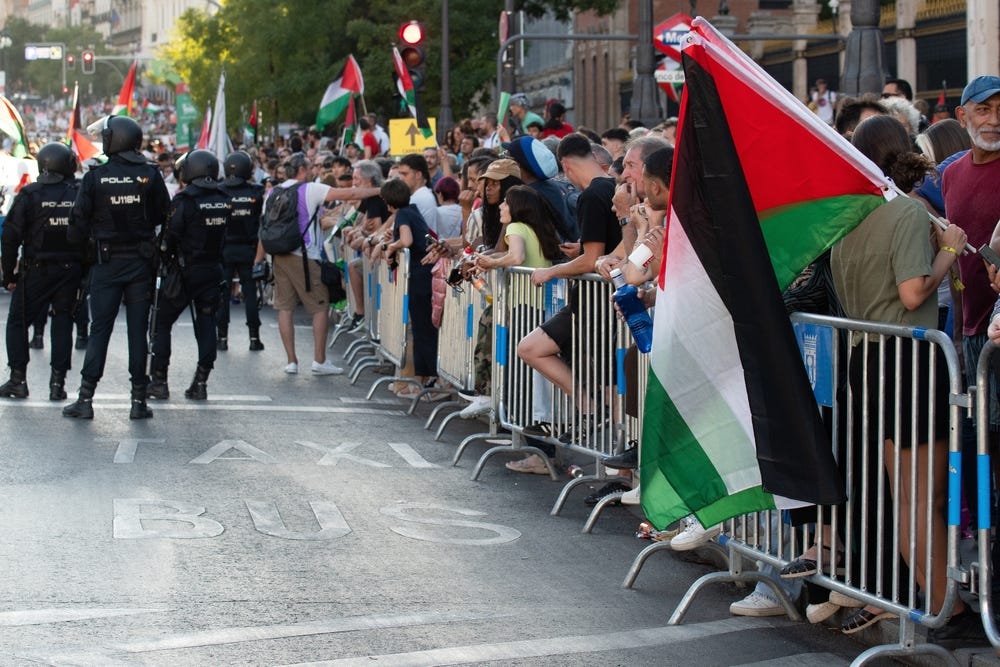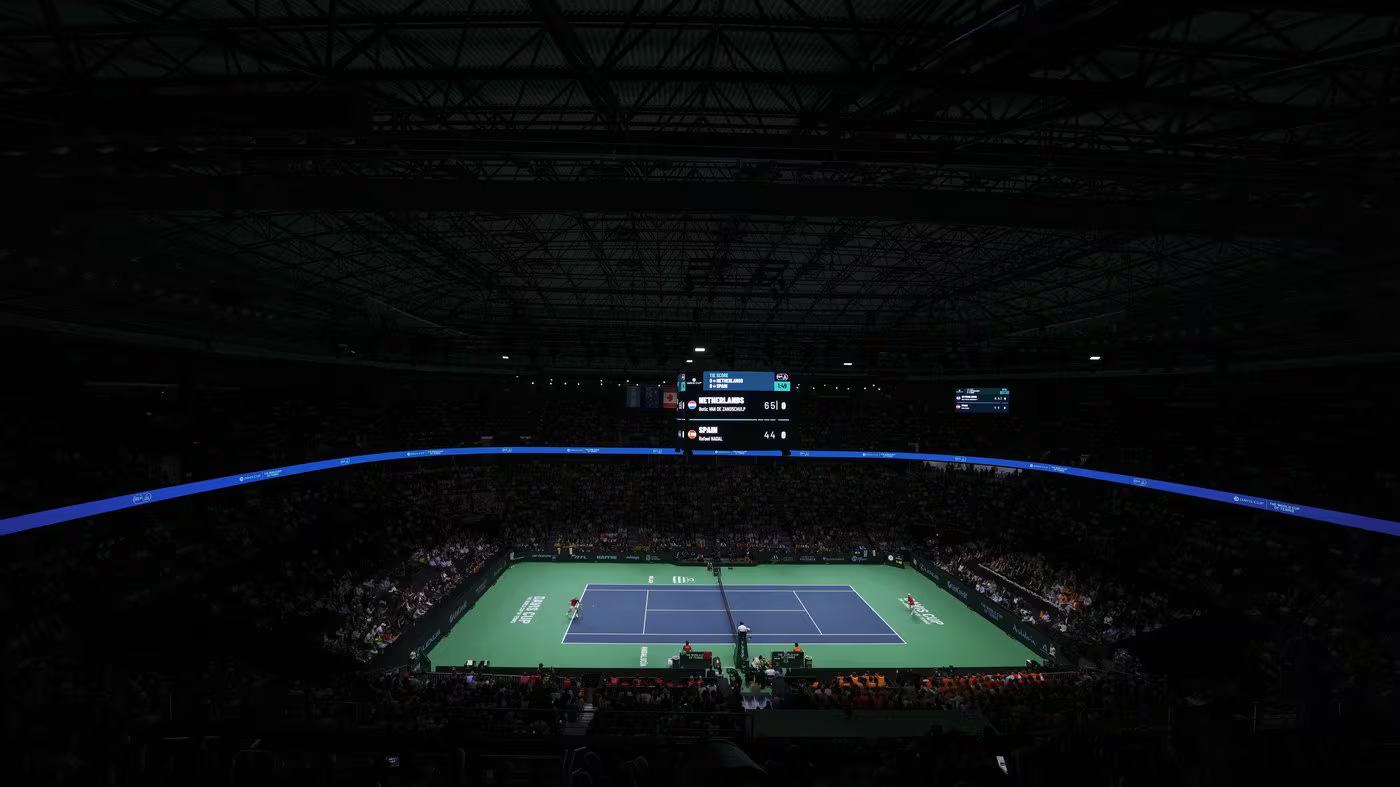Double Fault Israel
Can sports hold Israel accountable for genocide?
Welcome to Sports Politika, a media venture founded by investigative journalist and researcher Karim Zidan that strives to help you understand how sports and politics shape the world around us. My mission is to offer an independent platform for accessible journalism that raises awareness and empowers understanding.
If you share this vision, please consider supporting my work by joining becoming a paid subscriber. I am currently running a special offer whereby you can secure a subscription at a 40% discounted price…forever.
Hello,
I’m Sharon Nadeem, a producer and head of partnerships at the Global Reporting Centre (GRC), where I work on the podcast State of Play, exploring the intersection of sports, politics, and human rights.
Karim has kindly invited me to share my insights for this edition of Sports Politika, focusing on a story I have been closely following over the past few weeks. You may have heard about the controversy surrounding the Davis Cup matches in Halifax, Nova Scotia, involving the men’s teams from Canada and Israel. On September 9, Tennis Canada, the regulatory body for tennis in the country, announced that the matches would be held behind closed doors due to “intelligence from local and national agencies” regarding potential security risks.
But when I reached out to the Halifax Regional Police and the Nova Scotia RCMP to inquire about the specific security concerns they had identified, both agencies stated that they had not provided any risk assessments to Tennis Canada. The RCMP explicitly denied any involvement with the event. Canada’s national intelligence agency, CSIS, informed CBC News that it gave no such warning.
After several requests for clarification, Tennis Canada provided the following response:
As the event organizers, this decision was made by Tennis Canada after we received credible information from multiple sources, which proved to be accurate, and after reviewing recent disruptions at other sporting and cultural events, both in Canada and internationally.
Follow-up questions on who the “multiple sources” are, and how this information “proved to be accurate,” went unanswered. There are also questions about why Tennis Canada made the decision to hold the matches without fans, given the loss of revenue from ticket sales and tourism for the city of Halifax, which pulled their funding for the event.
While the source of the intelligence remains unclear, the narrative in mainstream media was of “violent” and “extremist Pro-Palestinian protestors” who were “threatening the safety of the event.” Even The New York Times did a story, but what all the outlets failed to do was reach out to a single one of the organizers.
I reached out to El Jones, an assistant professor at Mount St. Vincent University in Halifax, and one of the organizers in Halifax. She told me that this narrative echoed from the beginning. From the start of their first open letter, which was signed by more than 400 academics and athletes, including four-time Olympian Moh Ahmed and Palestinian soccer player Charlotte Phillips.
The letter urged Sport Canada and Tennis Canada not to go ahead with the tournament, stating that Canada should not host a team from a country that a United Nations Commission declared to be committing genocide in Gaza.
As El Jones put it:
“This event offers Israel the opportunity to sportswash its genocide in Gaza — to use sports to launder its reputation and distract from its human rights atrocities.”
She added that Canada has long understood sport as political — from its decision to boycott apartheid South Africa and withdraw from the Davis Cup in 1978 to Canadians booing the U.S. anthem last winter during NHL games.

The events of Davis Cup are just one part of what I see as a growing movement in sports, from disruption at cycling events like La Vuelta to a $1 million marketing campaign called “Game Over Israel” targeting soccer federations to ban Israel from UEFA and FIFA. To look at how and why sports have become an arena for resistance against genocide, I called up Nathan Kalman-Lamb, an assistant professor of sociology at the University of New Brunswick. Nathan focuses on the issues around exploitation and harm in the context of high-performance sport.
Nathan explained to me that this is not the first time this has happened in sports. During the apartheid regime in South Africa, the country was systematically banned from international sporting events for almost 3 decades.
“The South African Apartheid Project was really significantly undermined by the ostracization of South African Sport,” he said. He went on to tell me why boycotting Israel from sports would possibly have more of an impact than Russia, which has been banned from most sporting events since the invasion of Ukraine.
Nathan also talked about an upcoming paper arguing that Israel, which has killed over 800 Palestinian athletes since October 2023, is committing “athleticide as part of its genocidal project in Gaza”.
To hear more from my conversations with El Jones and Nathan Kalman-Lamb, you can listen to the full episode here. You’ll also hear from Charlotte Phillips, who plays for the Palestinian national soccer team, who gives me the critical perspective of an athlete and explains why she believes that it’s important for athletes to take a stand.
You can also follow my work at @sharonnadeem (Twitter) or at Bluesky (link). You can also subscribe to the Global Reporting Centre newsletter for updates.
Sports Politika is a newsletter about the intersection of sports, power and politics. If you like what you see, upgrade to a paid subscription ( or gift a subscription if you already have your own). We would appreciate if you could also like the post and let us know what you think in the comment section below.



